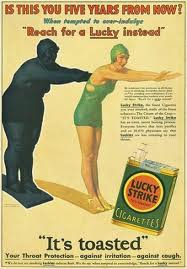
 Today,more than 200 health professionals attended the Institute for Women's Health Research at Northwestern University's first educational research forum of the 2010-2011 school year that featured Bonnie Spring, PhD, a behavioral psychologist at Northwestern. Her lecture entitled "Untangling the Web of Women, Smoking and Weight" made me realize how much we still need to learn about the power of addiction. Here are some interesting notes about smoking cessation and weight gain from her lecture:
Today,more than 200 health professionals attended the Institute for Women's Health Research at Northwestern University's first educational research forum of the 2010-2011 school year that featured Bonnie Spring, PhD, a behavioral psychologist at Northwestern. Her lecture entitled "Untangling the Web of Women, Smoking and Weight" made me realize how much we still need to learn about the power of addiction. Here are some interesting notes about smoking cessation and weight gain from her lecture:
- Reasons women continue to smoke: mood and stress management, addiction/craving, social network, weight management.
- Fear of weight gain discourages 50% of women and 26% of men who smoke from quitting. The reality is that 80% of people who quit smoking gain weight but the actual weight gain is about 6-10 lbs. , not the 15 lbs. that people assume.
- The major cause of post cessation weight gain: decreased metabolism (from nicotine cessation) and increased energy intake from snacks. Evidently, when we take away something the body values or provides pleasure (e.g., nicotine), we tend to substitute it with something else that we value (e.g. food).
- Education about the benefits of not smoking is not enough to change behavior; exercise alone to keep weight off while quitting smoking does not work.
- Drugs sometimes used during smoking cessation to keep weight down work while they are being used, but once they are stopped, the weight returns.
- Several studies have been conducted to determine if weight loss programs should be done simultaneously during smoking cessation therapy; shortly after smoking cessation has begun; or completely after the person quits. The results vary and it is not yet clear what the best approach is.
- A lot of controversy persists around the question: Do weight management efforts undermine tobacco abstinence? Despite several national guidelines that state so, there is no study that demonstrates that trying to prevent weight gain while trying to quit smoking makes it less likely that a woman will succeed at quitting smoking, according to Dr. Spring.
Some promising approaches that are being evaluated include:
- Sequential behavioral treatment (cessation, then diet and activity change) more effective than simultaneous treatment because it is less overwhelming to the patient.
- Exercise alone does not suppress weigh gain
- Bupropion, varenicline, NRT suppress weight gain in the short term, but not long-term (after medications discontinued)
- Weight acceptance (but so far tested only among very weight concerned smokers)
So the jury is still out on the best way to quit smoking. Dr. Spring also shared some of the early advertising campaigns that were highly successful in raising the number of women smokers. She noted, "Perhaps the best way to get women to quit smoking is to hire the companies that have been so successful in getting women addicted!"

Comments
Pages